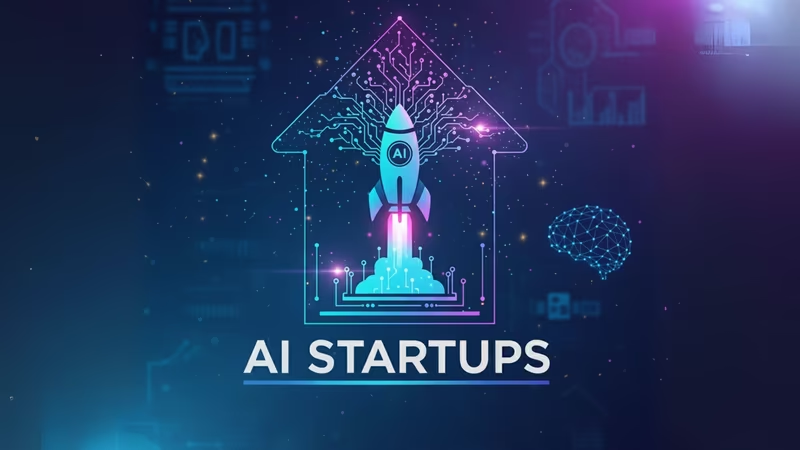For a long time, artificial intelligence existed on the periphery of our collective imagination, a subject relegated to science fiction and academic labs. But in 2025, that vision has fully matured.
AI is no longer a futuristic fantasy; it is a foundational technology that is rapidly being applied to solve real-world problems, boost productivity, and transform entire industries at scale.
By analyzing the current ecosystem, we can categorize AI companies into three distinct types: Core AI, Application AI, and Industry AI, whether you are an investor, a business leader, or simply an observer of the world's most transformative technology.
A Framework for a New Era: Core, Application, & Industry
To move beyond a flat list, we need to understand the different roles AI companies play in the economy.
- Core AI companies are the foundational builders. They develop the underlying technologies—like foundational models, core machine learning platforms, and data processing tools—that others will build upon.
A significant investment with a long-term payoff, Core AI is a strategic play, and its solutions are primarily used by highly technical professionals like data scientists and engineers.
- Application AI companies take existing AI technology and apply it to a specific, single task. These are often consumer-facing or serve a broad, cross-industry business need, such as generative AI tools for image creation or video editing.
They represent a medium-term investment that can be integrated into business processes and are used by a mix of technical and non-technical staff.
- Industry AI companies are the most specialized. They apply AI to solve a specific problem within a single industry vertical, from finance to healthcare to law.
These companies represent an investment that can provide a return almost immediately but are limited to a specific sector. Their solutions are often used by non-technical staff in fields like marketing, sales, and customer support.
Foundational & Core AI Innovators
These companies are defining the underlying technological landscape for everyone else.
OpenAI
Founded in December 2015 by Sam Altman, Elon Musk, Ilya Sutskever, and Greg Brockman, OpenAI is the pioneering AI research lab that created the widely recognized GPT series and ChatGPT.
The company recently secured a massive $6.6 billion funding round, pushing its post-money valuation to $157 billion and solidifying its position as one of the world's most valuable private companies.
Anthropic
Founded in 2021 by a group of former OpenAI members, including siblings Daniela Amodei and Dario Amodei, Anthropic is a key rival to OpenAI known for its focus on AI safety and ethical development.
Its flagship model, Claude, is a direct competitor to ChatGPT, offering a conversational AI with enhanced security and human-like interaction. The company’s run-rate revenue grew from approximately $1 billion at the start of 2025 to over $5 billion by August 2025.
Databricks
Founded in 2013 by the creators of Apache Spark, including Ali Ghodsi and Matei Zaharia, Databricks provides a unified analytics platform for businesses to process and manage large volumes of data.
It executed one of the largest venture capital raises of 2024, securing a staggering $10 billion in a funding round that increased its valuation to $62 billion.
xAI
Founded by Elon Musk and Christian Szegedy on March 9, 2023, xAI aims to push the boundaries of AI innovation. The company has made a significant mark with two separate $6 billion funding rounds.
Its flagship language model, Grok-3, debuted in 2025, showcasing advanced reasoning and deep-search capabilities powered by its Colossus supercomputer.
Don’t Miss: How India’s Top Edtech Companies Are Redefining Learning.
The Content Creation Engine
These startups are leveraging AI to generate new content across various mediums, from text to video.
Cohere
Founded in 2019 by Aidan Gomez, Ivan Zhang, and Nick Frosst, Cohere has positioned itself as a security-first enterprise AI provider. The company recently raised $500 million, bringing its valuation to $6.8 billion.
It focuses on secure, agentic AI solutions for businesses and governments, offering products like its "North" agentic platform.
Hugging Face
Founded in 2016 by French entrepreneurs Clément Delangue, Julien Chaumond, and Thomas Wolf, Hugging Face has become a major player in the open-source AI ecosystem.
It is a community forum akin to GitHub for AI and machine learning model development, with specialties in areas like text classification and image classification.
Stability AI
Founded in 2019 by Emad Mostaque and Cyrus Hodes, Stability AI is a prominent name in the generative AI space.
It is a leading startup for image and video content creation, with tools widely used in marketing, design, and media production.
Suno
Founded in 2021 or 2022 by Mikey Shulman, Martin Camacho, Georg Kucsko, and Keenan Freyberg, Suno is an AI music generator where users can create songs of up to four minutes from a simple text prompt.
The company has raised $125 million and has grown its user base to over 12 million.
Midjourney
Founded in August 2021 by entrepreneur David Holz, Midjourney is a generative AI art platform that allows users to create hyper-realistic artworks from natural-language prompts.
The company is noteworthy for being self-funded and has millions of users who have generated over 700 million images on the platform.
Also Read: Jio vs. Airtel – Who’s Winning the Telecom War in 2025?
AI for the Enterprise: The ROI & Security-Focused Solutions
These companies provide B2B solutions that directly integrate into business operations to improve efficiency and security.
Glean
Founded in 2019 by a team of Google and Facebook veterans, including Arvind Jain and T.R. Vishwanath, Glean is a generative AI enterprise search company that uses deep learning models to understand natural language queries within the context of an organization's internal data.
The company has achieved a $4.6 billion valuation, demonstrating strong investment confidence in its focus on AI privacy and governance for knowledge management.
AppZen
Founded in 2012 by Anant Kale and Kunal Verma , this startup has built an "agentic AI platform for finance teams" to automate back-office workflows like travel and expense audits and accounts payable.
AppZen recently landed a $180 million funding round and boasts over 500 global enterprise customers, including 65 of the Fortune 500.
Distyl AI
Founded in 2022 by former Palantir employees Arjun Prakash and Derek Ho , Distyl AI focuses on helping Fortune 500 companies become "AI-native" by deploying real, scalable solutions rather than mere prototypes.
The company recently raised a $175 million Series B round at a $1.8 billion valuation, a ninefold increase from its previous funding round.
Anterior
Founded in 2022 by Zahid Mahmood and Abdel Mahmoud.
Anterior is a startup that applies AI to the healthcare industry, with a focus on making clinical decision-making more frictionless.
Harvey
Founded in 2022 by Winston Weinberg and Gabriel Pereyra.
This company is a provider of AI-powered legal services, offering solutions to legal workers by streamlining contract drafting and analysis.
AI by Industry Vertical: Specialized AI for Specific Industries
These startups are focused on applying AI to solve problems in a single, specific industry.
Shield AI
A defense technology company founded in 2015 by Ryan Tseng and Andrew Reiter. It develops autonomous systems and AI pilots for military applications.
The company’s core technology is the Hivemind Software Development Kit (SDK), a reusable, platform-agnostic autonomy framework that significantly reduces the time required to deploy AI pilots on new aircraft.
AiSteth
A healthcare startup founded in 2023 by Satish Somayya Jeevannavar. It has developed an AI-powered smart stethoscope for the early detection of cardio-respiratory disorders, with a goal of reducing premature deaths from non-communicable diseases.
The company was recently selected for a Google accelerator program, which adds credibility to its work.
Emerging Disruptors and Noteworthy Newcomers
Rocket
A Surat, India-based startup founded in 2025 by Vishal Virani, Rahul Shingala, and Deepak Dhanak, Rocket has developed an AI app-building platform that allows users to create production-ready applications from natural language prompts.
It recently secured a $15 million seed funding round.
CoreWeave
An AI cloud infrastructure startup founded in 2017 by Michael Intrator and others, CoreWeave provides the foundational compute layer necessary for AI development.
The company secured a $1.1 billion funding round, reflecting the immense investor demand for the infrastructure that supports the AI revolution.
Discover how these pharma giants are driving innovation and trust in the healthcare industry.
Key Trends Shaping the AI Startup Ecosystem in 2025
Beyond the individual companies, the ecosystem itself is being shaped by several overarching trends.
The Rise of Agentic AI: The Shift from Tools to Autonomy A significant and recurring theme is the emergence of "agentic AI." This is not a mere buzzword but a technical descriptor for a new class of AI systems that can operate autonomously and take actions to achieve a goal, rather than simply generating content.
This represents a fundamental shift in the application of AI from a passive tool to an active agent in a workflow.
The Capital-as-a-Moat Strategy: The staggering amounts of capital being raised by the leading AI companies are not arbitrary; they represent a strategic imperative to build a defensible business.
The largest funding deals of 2024 were for companies operating at the foundational layer of the ecosystem: Databricks with a $10 billion raise, OpenAI with $6.6 billion, and xAI with two separate $6 billion rounds.
The high cost of building and training frontier models creates a significant barrier to entry, ensuring that only a few well-capitalized players can compete at the foundational layer.
By raising and deploying billions of dollars, these companies are not just funding operations; they are creating a durable competitive advantage.
The Strategic Role of Hyperscalers and Chipmakers: The AI startup ecosystem is not evolving in a vacuum; it is being actively shaped by the strategic actions of major tech companies.
Rather than solely competing, companies like NVIDIA, Amazon, and Microsoft are strategically investing in and partnering with startups to secure their position in the new AI economy.
For example, Amazon’s $4 billion investment in Anthropic is tied to a strategic partnership where Anthropic named Amazon Web Services its primary cloud provider. This creates a symbiotic relationship where the investment secures a future revenue stream for Amazon's cloud business.
Conclusion
The path to creating a definitive, market-leading resource on AI startups requires a shift from a list-based approach to a comprehensive, strategic guide.
By understanding the ecosystem through the lens of Core, Application, and Industry AI, you can produce a resource that not only answers the surface-level queries but also provides a deep, authoritative understanding of the ecosystem.
The final article will not only rank highly for its target keywords but will also establish itself as a go-to resource for anyone seeking to understand the dynamic and rapidly evolving world of artificial intelligence startup companies.
Pro tip: Automate your savings with Jar. Watch them shine as bright as gold!










